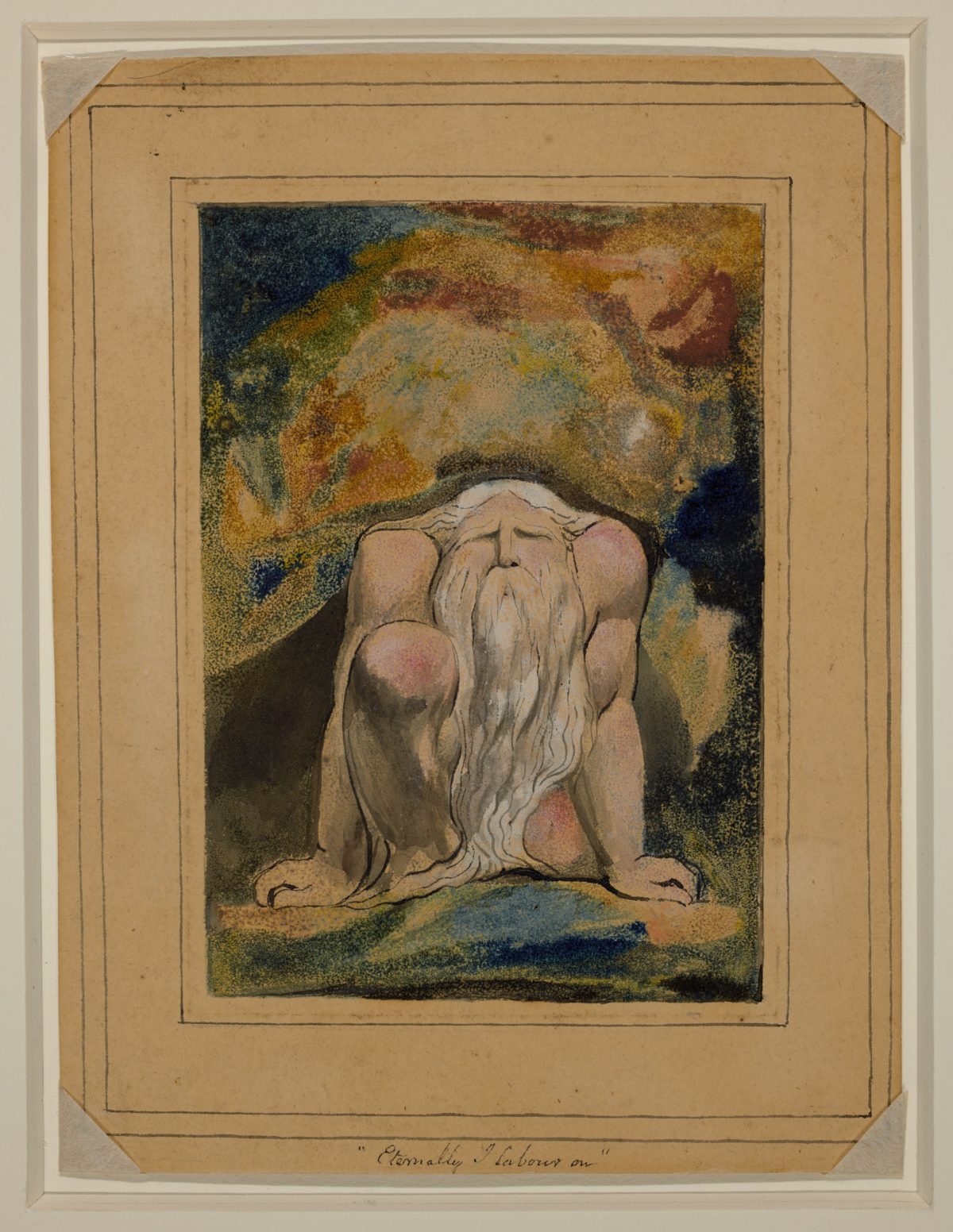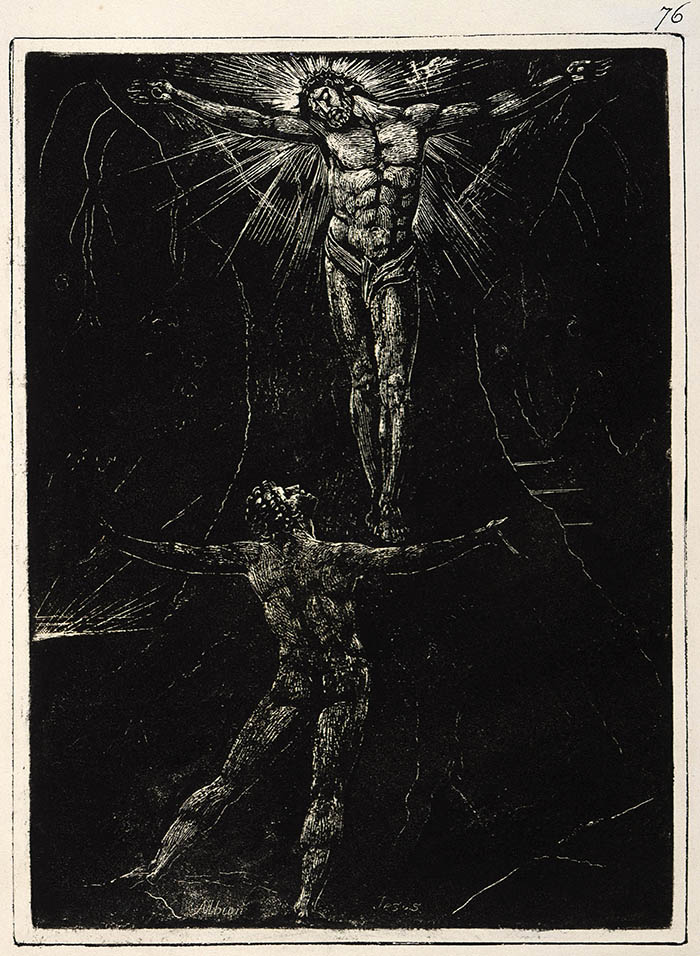PE [Psychic Energy] typically refers to the dynamics that empower human motivation and vitality. It also implies a direction-oriented force that fuels the pursuit and achievement of life goals and plans (Lewin, 1951; Wright, 1987; Baumeister, 2002).
British Museum Illustrations to Young's Night Thoughts |
Blake's use of the sandal as a symbol was influenced by passage in the books of Mark and Acts in the New Testament. Two dramatic stories emphasize the putting on of sandals as emblematic of significant transitions in the abilities of the individuals who wore them. In Mark, Jesus send the disciples out by twos wearing sandals and without necessities to sustain themselves. What Jesus provided them with was power over unclean spirits. Mark reports that on their journey the disciples were able to cast out Devils and restore the sick to health. Before this time Jesus' disciples were not reported to have been capable of ministering in this way.
Following the account of the disciples going out by twos is another account of a change in Jesus' ministry when John the Baptist was beheaded at Herod's command. The chapter in Mark continues with the feeding of the masses, Jesus walking on the sea, the calming the waves, and making whole those who were ill. The power of Jesus underwent a pronounced alteration after he sent the disciples forth with the capacity to heal and saw them return reporting outstanding success. The atrocity against John the Baptist compounded the feeling that the time had come to make known the mission for which Jesus was sent into the world.
In the Book of Acts we read of Peter binding on his sandals before escaping from prison under the protection of an angel. Herod's execution order was thwarted, which allowed Peter to continue his ministry which was essential to the survival and growth of the young church.
Mark 6
[7] And he called unto him the twelve, and began to send them forth by two and two; and gave them power over unclean spirits;
[8]
And commanded them that they should take nothing for their journey,
save a staff only; no scrip, no bread, no money in their purse:
[9] But be shod with sandals; and not put on two coats.
[10] And he said unto them, In what place soever ye enter into an house, there abide till ye depart from that place.
[11]
And whosoever shall not receive you, nor hear you, when ye depart
thence, shake off the dust under your feet for a testimony against them.
Verily I say unto you, It shall be more tolerable for Sodom and
Gomorrha in the day of judgment, than for that city.
[12] And they went out, and preached that men should repent.
[13] And they cast out many devils, and anointed with oil many that were sick, and healed them.
...[22] And when the daughter of the said Herodias came in, and
danced, and pleased Herod and them that sat with him, the king said unto
the damsel, Ask of me whatsoever thou wilt, and I will give it thee.
[23] And he sware unto her, Whatsoever thou shalt ask of me, I will give it thee, unto the half of my kingdom.
[24] And she went forth, and said unto her mother, What shall I ask? And she said, The head of John the Baptist.
Acts 12
[5] Peter therefore was kept in prison: but prayer was made without ceasing of the church unto God for him.
[6]
And when Herod would have brought him forth, the same night Peter was
sleeping between two soldiers, bound with two chains: and the keepers
before the door kept the prison.
[7] And, behold, the angel of
the Lord came upon him, and a light shined in the prison: and he smote
Peter on the side, and raised him up, saying, Arise up quickly. And his
chains fell off from his hands.
[8] And the angel said unto
him, Gird thyself, and bind on thy sandals. And so he did. And he saith
unto him, Cast thy garment about thee, and follow me.
[9] And he went out, and followed him; and wist not that it was true which was done by the angel; but thought he saw a vision.
In the same way Blake used the sandal as a symbol signifying a transition between states of consciousness. In Plate 8 of Milton, Satan had introduced a chaotic state by exchanging labors with Palamabron. The removal of Los' left sandal indicated the inception of a period of mourning over the loss of the fine balance among the states of wrath, pity and error.
On Milton Plate 21 binding on the sandal suggests that Blake himself was undergoing a stage of development. To 'walk forward thro' Eternity' he bound upon his foot the natural world as though a sandal.
Plate 22 of Milton reveals Blake becoming one with Los in order to continue his journey through Udan-Adan. The strength that Blake needed he received when Los 'stoop'd down And bound my sandals on.'
Golden Sandals are mentioned on Plate 83 of Jerusalem. Los wears them on his watch as he patrols Golgonooza to protect it from the Spectre lest the work of the furnaces be destroyed.
Milton, Plate 8, (E 101)
"Los beheld
The servants of the Mills drunken with wine and dancing wild
With shouts and Palamabrons songs, rending the forests green
With ecchoing confusion, tho' the Sun was risen on high.
Then Los took off his left sandal placing it on his head,
Signal of solemn mourning: when the servants of the Mills
Beheld the signal they in silence stood, tho' drunk with wine.
Los wept! But Rintrah also came, and Enitharmon on
His arm lean'd tremblingly observing all these things
And Los said. Ye Genii of the Mills! the Sun is on high
Your labours call you! Palamabron is also in sad dilemma;
His horses are mad! his Harrow confounded! his companions enrag'd.
Mine is the fault! I should have remember'd that pity divides the soul
And man, unmans: follow with me my Plow. this mournful day
Must be a blank in Nature: follow with me, and tomorrow again
Resume your labours, & this day shall be a mournful day"Milton, Plate 21 [23], (E 115) "But I knew not that it was Milton, for man cannot know
What passes in his members till periods of Space & Time
Reveal the secrets of Eternity: for more extensive
Than any other earthly things, are Mans earthly lineaments.
And all this Vegetable World appeard on my left Foot,
As a bright sandal formd immortal of precious stones & gold:
I stooped down & bound it on to walk forward thro' Eternity. Milton, Plate 22 [24], (E 116)
"Tho driven away with the Seven Starry Ones into the Ulro
Yet the Divine Vision remains Every-where For-ever. Amen.
And Ololon lamented for Milton with a great lamentation.
While Los heard indistinct in fear, what time I bound my sandals
On; to walk forward thro' Eternity, Los descended to me:
And Los behind me stood; a terrible flaming Sun: just close
Behind my back; I turned round in terror, and behold.
Los stood in that fierce glowing fire; & he also stoop'd down
And bound my sandals on in Udan-Adan; trembling I stood
Exceedingly with fear & terror, standing in the Vale
Of Lambeth: but he kissed me and wishd me health.
And I became One Man with him arising in my strength:"Jerusalem, Plate 83, (E 242) "While Los arose upon his Watch, and down from Golgonooza
Putting on his golden sandals to walk from mountain to mountain,
He takes his way, girding himself with gold & in his hand
Holding his iron mace: The Spectre remains attentive
Alternate they watch in night: alternate labour in day
Before the Furnaces labouring, while Los all night watches
The stars rising & setting, & the meteors & terrors of night!" .jpg) |
Wikimedia Jerusalem Frontispiece, Copy b |




